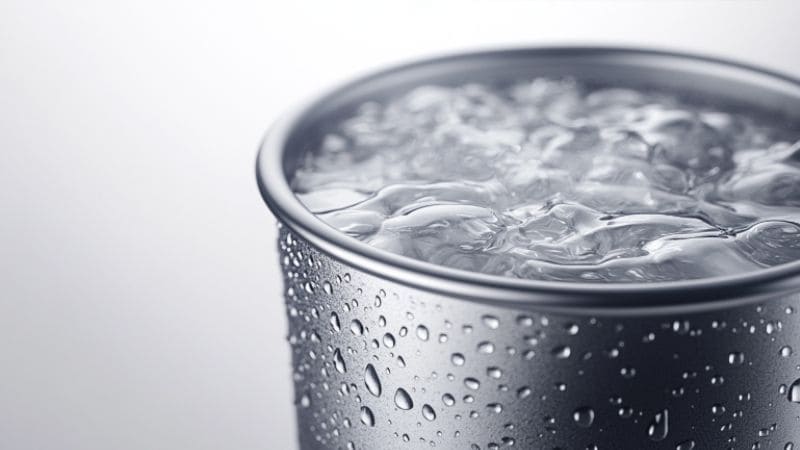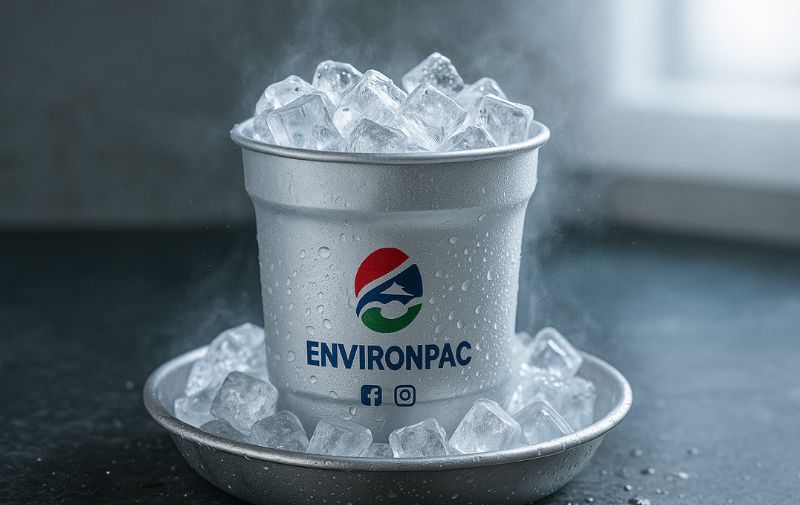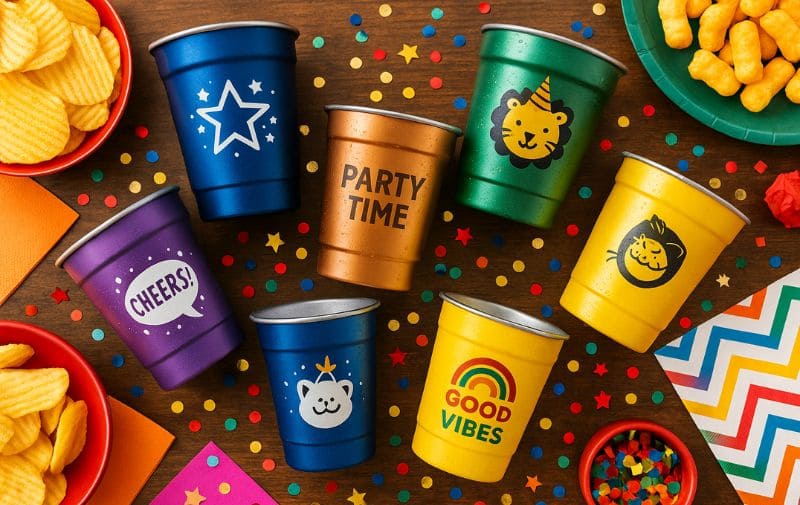Table of Contents
Are you unsure how many times you can reuse aluminum cups? With growing environmental concerns and rising demand for sustainable products, many people are switching from single-use plastics to reusable aluminum cups. Conflicting information on the durability and reusability of aluminum cups leaves consumers confused. Some say they only last a few uses, while others claim they last forever. So, what’s the truth?
Aluminum cups are highly reusable. With proper care, they can be reused 20 to 50 times or more, offering durability, sustainability, and cost savings over single-use plastic cups.
If you’ve ever wondered how long your recyclable aluminum cups can last, this in-depth guide will walk you through everything you need to know.
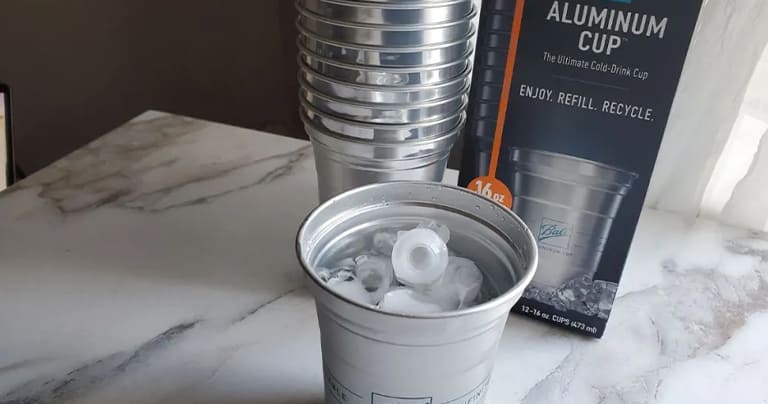
What Are Aluminum Cups Made Of?
Aluminum cups are made from food-grade aluminum, a safe, lightweight, and corrosion-resistant metal. Unlike other metals, aluminum has a unique ability to form a protective oxide layer when exposed to air. This natural barrier prevents corrosion and enhances the material’s durability. Most modern aluminum cups also have a BPA-free protective coating to further prevent any risk of leaching and maintain beverage taste.
Key Components of Aluminum Cups
| Component | Function |
|---|---|
| Food-Grade Aluminum | Durable, lightweight, and safe for direct contact with food and beverages |
| BPA-Free Coating | Prevents direct contact between liquid and raw aluminum, stops metallic taste |
| Protective Oxide Layer | Self-forming barrier that resists corrosion and leaching naturally |
This combination of materials makes aluminum cups more versatile than glass or plastic. Their ability to withstand drops, temperature changes, and rough handling has made them a top choice for sports stadiums, music festivals, and reusable party cups. Additionally, unlike plastic, which can only be recycled a limited number of times, aluminum can be recycled infinitely.
How Durable Are Aluminum Cups?
Aluminum cups are built for durability, making them far more resistant to damage than plastic, glass, or paper cups. Their ability to endure repeated use is one of the biggest reasons for their growing popularity. The durability of aluminum cups is due to the natural strength of aluminum itself and the added protection from BPA-free coatings.
Why Aluminum Cups Are Built for Extended Use
- Impact Resistance: Unlike glass cups, aluminum doesn’t shatter when dropped. It can withstand rough handling at concerts, sports events, and home parties.
- Scratch Resistance: Coated aluminum cups resist scratches, which keeps them looking new even after multiple uses.
- Temperature Resistance: Aluminum cups are suitable for both hot and cold beverages, though caution is advised with uncoated versions and hot liquids.
How Durability Affects Reusability
- Daily Use Durability: Even with daily use, coated aluminum cups can last for months or even years.
- Resistance to Wear and Tear: Coated aluminum cups resist scratches better than raw aluminum, and they don’t degrade as quickly as plastic.
- Use in Events and Stadiums: Reusable aluminum cups have been adopted by stadiums and festivals to reduce waste from single-use plastic cups.
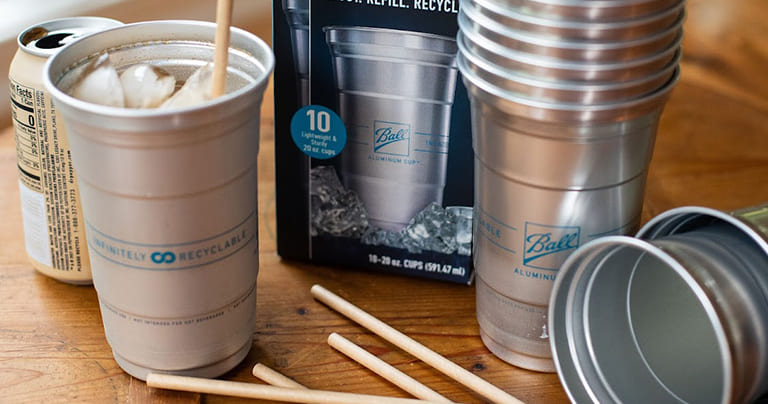
How Many Times Can You Reuse an Aluminum Cup?
The number of times you can reuse an aluminum cup depends on its design, usage, and care. On average, coated aluminum cups can be reused 20 to 50 times or more, while uncoated cups may have a shorter lifespan. However, with proper maintenance, aluminum cups used in households or at events can last for several years. Factors such as cleaning practices, exposure to acidic drinks, and handling frequency play a role in determining how many uses you’ll get out of each cup.
Factors Affecting Reusability
- Coated vs. Uncoated: Coated cups last longer as the protective lining shields them from scratches, acidic liquids, and physical damage.
- Frequency of Use: Aluminum cups used daily may need replacement within 6-12 months, but those used occasionally can last for years.
- Cleaning Methods: Hand-washing cups instead of using a dishwasher can prevent coating damage, extending their lifespan.
How to Tell If It’s Time to Replace Your Aluminum Cup
- Damaged Coating: If the BPA-free coating is scratched or worn away, the aluminum may leach into drinks.
- Dents or Cracks: While small dents won’t affect functionality, deep dents could impact structural integrity.
- Metallic Taste: If you taste metal in your drink, it could be a sign that the coating has worn off.
By following proper cleaning, storage, and handling guidelines, aluminum cups can be reused dozens of times, making them a cost-effective, eco-friendly alternative to single-use drinkware.
Is it safe to reuse aluminum cups?
Most of the studies that were done involving aluminum as a material supported the claim that aluminum cups are not safe for drinking, but as long as it is free from damage and clean then it is possible to use it. Some people use aluminum cups with a coating applied and this solves the problem of leaching because the coating acts as such by preventing the drink from ever coming into contact with the metal.
Are Aluminum Cups Safe After Repeated Use?
- Coated Aluminum Cups: Coated cups remain safe even after multiple uses, as long as the coating is intact.
- Uncoated Aluminum Cups: While safe for water, uncoated cups may leach small amounts of aluminum when exposed to acidic beverages like lemonade or soda.
- No BPA or Toxins: Unlike plastic cups, aluminum drinkware does not contain BPA, phthalates, or other toxic chemicals.
What Makes an Aluminum Cup Unsafe?
- Scratches and Chips: If the protective lining is scratched, beverages could come into direct contact with aluminum.
- Metallic Taste: If you taste metal in your drink, it’s a sign that the coating has been compromised.
- Visible Damage: Severe dents or cracks may affect the structural integrity of the cup.
Key Takeaway: If your aluminum cup shows signs of wear or damage, consider replacing it to maintain optimal safety. Coated cups are your best bet for long-term reusability, as the protective barrier prevents leaching and ensures beverage safety.

Do Aluminum Cups Degrade Over Time?
Unlike plastic, aluminum does not “degrade” or break down chemically. Instead, aluminum maintains its integrity over time, even after multiple uses. However, the protective coating on coated aluminum cups may degrade if not properly maintained. The natural aluminum oxide layer also acts as a self-forming barrier that protects raw aluminum from corrosion.
Signs of Degradation
- Scratched Coating: If the protective coating becomes scratched, the raw aluminum underneath is exposed. This can lead to leaching, especially with acidic drinks.
- Discoloration and Water Spots: Water spots and discoloration may form if cups are stored while wet, but these are aesthetic issues and do not affect the cup’s safety.
- Bending and Dents: While minor dents don’t affect performance, large dents may reduce the cup’s reusability.
How to Prevent Degradation
- Clean Cups Gently: Use a soft sponge and mild soap to prevent scratches.
- Avoid Harsh Scrubbing: Abrasive cleaning tools can wear down the protective coating.
- Dry Cups Before Storage: Water left on aluminum cups can leave marks or cause discoloration.
- Use Coated Cups: Coated cups are better protected against physical wear, ensuring longer use.
While raw aluminum is unlikely to degrade, the coating on aluminum cups is more susceptible to wear. If stored correctly and cleaned gently, your aluminum cups can last for years without degrading, making them a superior option for reusable drinkware.
How to Clean and Care for Aluminum Cups Cups
There are certain ways of cleaning and caring for aluminum cups which need to be kept in mind and exactly followed to help improve the life span of the cups. Many times some aluminum cups are specifically marked as dishwasher safe but it is always advisable to wash these cups by hand. The surface of coated aluminum cups is designed to resist corrosion and scratches but even so, coarse scrubbing does wear this coating out over extended periods of time.
Best Cleaning Practices
- Hand Washing Preferred: Wash aluminum cups by hand using mild soap, warm water, and a soft sponge.
- Avoid Abrasive Scrubbers: Steel wool, scouring pads, and abrasive brushes can wear down the protective coating.
- Dishwasher Use: Some aluminum cups are labeled dishwasher-safe, but repeated dishwasher use can weaken the coating.
Storage Tips for Longevity
- Store in a Dry Place: Moisture can leave stains or discoloration. Make sure aluminum cups are completely dry before storage.
- Stack Carefully: Avoid stacking too many cups together, as friction may cause scratches.
- Keep Away from Acidic Environments: Avoid prolonged exposure to acidic liquids (like vinegar or lemon juice) as they can degrade the coating.
Maintenance Checklist
| Task | Frequency | Why It Matters |
|---|---|---|
| Hand Wash | After every use | Prevents scratches and extends lifespan |
| Dry Before Storage | After every wash | Prevents water spots and discoloration |
| Inspect Coating | Monthly | Identify and address wear early |
| Avoid Abrasive Tools | Always | Keeps the coating intact and safe |
By following these cleaning and maintenance tips, you can extend the life of aluminum cups for several years. Proper cleaning ensures they stay safe, look new, and remain effective for both personal and commercial use.
How Long Can Aluminum Cups Last with Daily Use?
The lifespan of aluminum cups with daily use depends on factors like cleaning methods, type of cup (coated vs. uncoated), and handling practices. On average, an aluminum cup can last anywhere from 6 to 12 months with daily use, but with proper care, this can be extended to several years. Coated aluminum cups, such as those with BPA-free linings, tend to last longer since the coating protects the aluminum from direct contact with beverages, acids, and cleaning agents.
Factors That Affect Lifespan
- Coating Integrity: If the cup is coated, its lifespan will be longer, as the coating prevents scratches and keeps the surface smooth.
- Frequency of Use: If used daily, wear and tear will naturally increase, especially in commercial or high-traffic settings.
- Cleaning and Handling: Harsh scrubbing or abrasive cleaners can weaken the coating, exposing raw aluminum, which may result in a metallic taste.
Signs It’s Time to Replace an Aluminum Cup
- Scratches or Chips in Coating: Exposed aluminum increases the chance of leaching with acidic drinks.
- Metallic Taste in Beverages: This indicates that the protective coating may be compromised.
- Dents or Cracks: While minor dents won’t affect usability, severe dents may compromise structural integrity.
If cleaned properly and stored in a dry environment, aluminum cups can last for years, especially if used less frequently. Occasional users may never need to replace their aluminum drinkware, making it a sustainable, long-term investment for both households and large-scale event organizers.
Conclusion
Aluminium cups do their bit to solve the single-use plastic problem. If properly cared for, washing by hand and not using strong cleaners, they can last for several dozen cups.

